Matias Palva group studies the systems-level neuronal mechanisms of emergent neuronal and behavioral dynamics.
Spontaneous brain activity fluctuates in time scales spanning at least across five orders of magnitude. These fluctuations have also been observed on all studied spatial scales and they are statistically governed by spatio-temporal power-laws.
Such a scale-free organization at a macroscopic level is, however, contrasted by salient scale-specific neuronal activities - neuronal oscillations. Our research addresses the functional significance of scale-free and scale-specific brain dynamics in human sensory perception, cognitive performance, and motor output.
We have developed methods for MEG/EEG source reconstruction, optimized cortical parcellations, and quantification of neuronal/behavioral scaling-laws as well as for the mapping of dynamic neuronal interaction networks from invasive and non-invasive electrophysiological recordings of human brain activity. We are also in the process of translating our data management, analysis, and visualization platform into a more easily shareable python package.
Our three main research lines are 1. Assessing the functional roles of brain criticality and connectivity in human cognition by using MEG/EEG and SEEG based connectomes of neuronal couplings and "dynomes" of spatio-temporal dynamics. We are also performing simulations of brain dynamics and utilize several lines of interventional approaches, from electric and magnetic brain stimulation to cognitive training. 2. Identifying the roles of dysconnectivity and dysdynamics in mental disorders such as depression, anxiety, ADHD and schizophrenia, with the major depressive disorder being our main research focus. 3. Developing neuroplasticity-recruiting cognitive training methods for targeted alterations of cortical connectivity and dynamics.
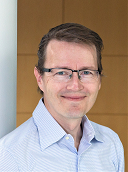
E-mail: matias.palva(@)helsinki.fi, Tel: +358 2941 576 12
[TUHAT] [Google Scholar] [LinkedIn] [ORCID]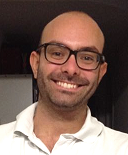 Gabriele Arnulfo, PhD (University of Genoa)
Gabriele has a PhD in Bioengineering from the University of Genoa (2012). For his thesis, he analyzed large-scale brain networks in intra-cranial data acquired from human subjects.
Gabriele Arnulfo, PhD (University of Genoa)
Gabriele has a PhD in Bioengineering from the University of Genoa (2012). For his thesis, he analyzed large-scale brain networks in intra-cranial data acquired from human subjects. He is currently investigating large-scale synchronized brain networks and trying to disentangle the effects on synchronized neural activity in case of different neurological disorders such as focal epilepsy or Parkinson's disease.
[Google Scholar] [LinkedIn]
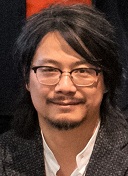 Sheng Wang, PhD (at Aalto University and NeuroSpin Paris)
Sheng joined us in 2012 after obtaining his MA and BA in psychology and neuroscience at York University, Toronto, Canada.
In November 2021, he defended with distinction his PhD in Physiology and Neuroscience at Helsinki University.
Sheng has been advancing theories and methods to research brain criticality and functional connectivity, and he is now focusing on investigating brain dynamics in epilepsy.
Sheng has been a visiting researcher at Aalto University from December 2019, and he is currently a Finnish Cultural Foundation and Sigrid Jusélius Foundation fellow visiting and working with Philippe Ciuciu at
CEA/NeuroSpin and Inria/MIND in Paris-Scaly, France.
Sheng Wang, PhD (at Aalto University and NeuroSpin Paris)
Sheng joined us in 2012 after obtaining his MA and BA in psychology and neuroscience at York University, Toronto, Canada.
In November 2021, he defended with distinction his PhD in Physiology and Neuroscience at Helsinki University.
Sheng has been advancing theories and methods to research brain criticality and functional connectivity, and he is now focusing on investigating brain dynamics in epilepsy.
Sheng has been a visiting researcher at Aalto University from December 2019, and he is currently a Finnish Cultural Foundation and Sigrid Jusélius Foundation fellow visiting and working with Philippe Ciuciu at
CEA/NeuroSpin and Inria/MIND in Paris-Scaly, France.[TUHAT] [LinkedIn] [Google Scholar]
 Wenya Liu, PhD (at Aalto University and University of Helsinki)
Wenya obtained her doctoral degree at the Faculty of Information Technology, Jyväskylä.
She joined our lab in December 2021 and is working on behavioural phenotyping and MEG data analysis as part of the 'Plasticity Stimulation in the Treatment of Anhedonia' project.
This project, which is funded by the Wellcome Leap Multi-Channel Psych research program, aims to study the effects of video games on depression symptoms and brain dynamics.
Wenya Liu, PhD (at Aalto University and University of Helsinki)
Wenya obtained her doctoral degree at the Faculty of Information Technology, Jyväskylä.
She joined our lab in December 2021 and is working on behavioural phenotyping and MEG data analysis as part of the 'Plasticity Stimulation in the Treatment of Anhedonia' project.
This project, which is funded by the Wellcome Leap Multi-Channel Psych research program, aims to study the effects of video games on depression symptoms and brain dynamics. [Google Scholar]
 Vladislav Myrov, MSc (at Aalto University)
Vlad studied bioinformatics at Saint Petersburg Academic University, obtaining a MSc. He joined us in 2018 and defended his PhD in 2024. His research is focused on computational modelling of oscillatory processes.
Vladislav Myrov, MSc (at Aalto University)
Vlad studied bioinformatics at Saint Petersburg Academic University, obtaining a MSc. He joined us in 2018 and defended his PhD in 2024. His research is focused on computational modelling of oscillatory processes. [Google Scholar]
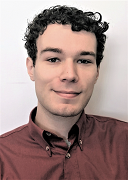 Merlin Dumeur (at Aalto University)
Merlin has a engineering diploma (equivalent to MSc) and has carried out reseach at various institutes in France and Japan.
Merlin Dumeur (at Aalto University)
Merlin has a engineering diploma (equivalent to MSc) and has carried out reseach at various institutes in France and Japan. Since 2020, he has been pursuing a joint PhD at Cotutelle Universite Paris-Saclay and Aalto University, researching multifractality in human brain imaging data.
 Joona Repo, MSc (at Aalto University)
Joona has a BSc in Bioinformation Technology and a MSC in Human Neuroscience and Technology from Aalto University.
He wrote his Bachelor's thesis on transcranial alternating current stimulation and his Master thesis on neuronal entrainment.
He joined our group in 2022 and is working on computational modelling and virtual rMTS stimulation.
Joona Repo, MSc (at Aalto University)
Joona has a BSc in Bioinformation Technology and a MSC in Human Neuroscience and Technology from Aalto University.
He wrote his Bachelor's thesis on transcranial alternating current stimulation and his Master thesis on neuronal entrainment.
He joined our group in 2022 and is working on computational modelling and virtual rMTS stimulation.
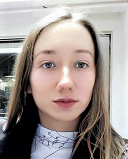 Samanta Knapič, MSc (at Aalto University)
Samanta obtained her BSc in biopsychology at University of Primorska, Slovenia and a joint MSc in cognitive science and psychology at Umeå University, Sweden and most recently a MSc in Neuroscience from Helsinki in 2024.
She joined our group in 2022 and is currently investigating human brain structural connectivity, biomarkers of Major depressive disorder, and Griffiths Phase criticality; using Magnetic resonance imaging (MRI), Diffusion weighted imaging (DWI) and computational modeling with a Kuramoto model.
Samanta Knapič, MSc (at Aalto University)
Samanta obtained her BSc in biopsychology at University of Primorska, Slovenia and a joint MSc in cognitive science and psychology at Umeå University, Sweden and most recently a MSc in Neuroscience from Helsinki in 2024.
She joined our group in 2022 and is currently investigating human brain structural connectivity, biomarkers of Major depressive disorder, and Griffiths Phase criticality; using Magnetic resonance imaging (MRI), Diffusion weighted imaging (DWI) and computational modeling with a Kuramoto model.
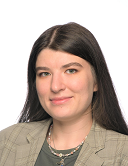 Alina Suleimanova, MSc (at Aalto University)
Alina has a BSc in applied informatics from Kazan Federal University and obtained her MSc in biomedical engineering at Aalto University.
Since 2022, she has been working in our group developing personalized Kuramoto models of oscillatory brain activity.
Alina Suleimanova, MSc (at Aalto University)
Alina has a BSc in applied informatics from Kazan Federal University and obtained her MSc in biomedical engineering at Aalto University.
Since 2022, she has been working in our group developing personalized Kuramoto models of oscillatory brain activity.
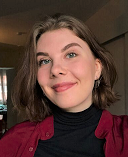 Vilma-Reetta Bergman (at University of Helsinki and Aalto University)
Vilma-Reetta has a BSc in Psychology from University of Helsinki and is currently completing her Master’s programme in Psychology. She joined the lab in 2022 and is working in the group as a Clinical Subject Coordinator.
Vilma-Reetta Bergman (at University of Helsinki and Aalto University)
Vilma-Reetta has a BSc in Psychology from University of Helsinki and is currently completing her Master’s programme in Psychology. She joined the lab in 2022 and is working in the group as a Clinical Subject Coordinator.
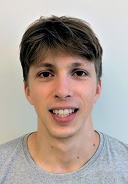 Jussi Häkkänen (at Aalto University)
Jussi has a BSc in computer science from Aalto University and is currently pursuing MSc in applied mathematics.
He joined the group in 2024 and is working on computational modelling, explicitly state space estimation with a Kuramoto model.
Jussi Häkkänen (at Aalto University)
Jussi has a BSc in computer science from Aalto University and is currently pursuing MSc in applied mathematics.
He joined the group in 2024 and is working on computational modelling, explicitly state space estimation with a Kuramoto model.
Contact:
To contact use firstname.lastname@helsinki.fi, firstname.lastname@aalto.fi, or firstname.lastname@glasgow.ac.uk.